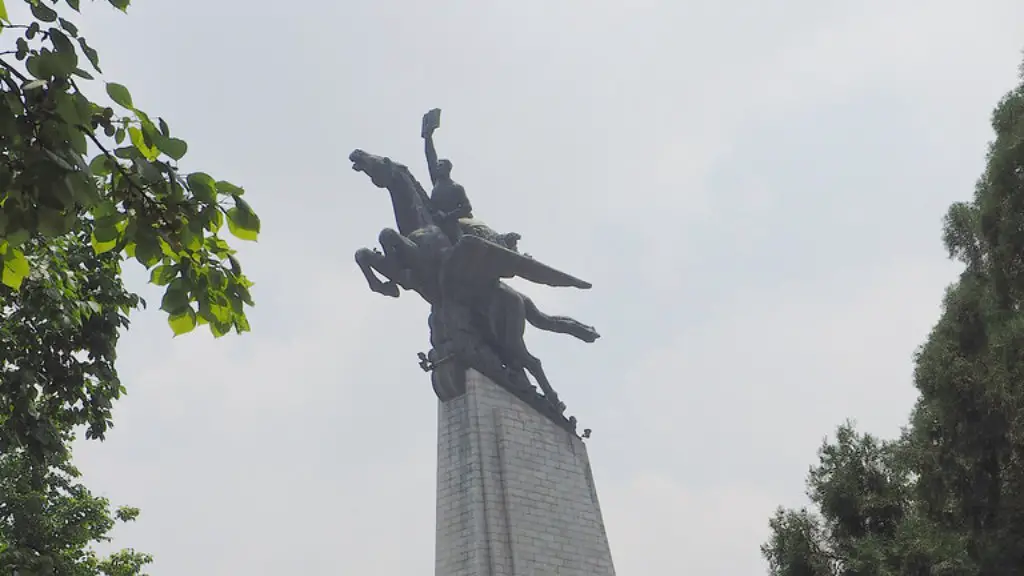Economic Struggles
North Korea has continued to struggle with achieving sustained economic growth and has struggled with developing stable economic policies. North Korea is ranked as one of the least free and least open economies in the world. Its imports and exports are heavily restricted and it lacks access to foreign aid and resources. This lack of access to capital and outside economic assistance has left North Korea extremely dependent on its own resources, which is not enough for sustained growth. According to a World Bank Report, North Korea’s GDP in 2018 was $40.3 billion, compared to South Korea’s GDP of $1.6 trillion in the same year. The economic differences between the two countries is starkly visible when looking at the prices of consumer goods; for example, the price of an average daily meal in North Korea is $0.60 compared to $30 in South Korea.
North Korea’s dependence on its own resources has also led to disastrous economic policies, such as the country’s failed currency reforms in 2009. This policy was aimed at countering the effect of international sanctions and countering the effects of black markets. The policy instead led to high inflation rates, resulting in poverty and food shortages in the country. According to a World Bank Report, North Korea’s Gini coefficient, which measures inequality in a country, is one of the highest in the world. This high inequality indicates that North Korea’s economy is largely dependent on the wealthy few, with the majority of the population facing difficult economic conditions.
Restrictions on Civil Liberties
The people of North Korea are subject to a range of restrictions on their civil liberties, which is one of the major factors contributing to the country’s economic and social backwardness. The nation is ruled by an authoritarian political system that closely monitors its citizens and enforces strict laws. Freedom of speech, press, and assembly are not tolerated in North Korea and dissenters are treated very harshly. Additionally, North Korea has also been criticized for its treatment of political prisoners in the country. A report by a UN panel found that North Korea has committed systematic and gross human rights violations against its citizens.
North Korea’s citizens are closely monitored by the government and there is an extensive system of surveillance throughout the country. People are required to submit regular reports to the government, and are closely monitored by local police or security officials. North Korea has also waged a campaign to isolate its citizens from the rest of the world; the country limits access to foreign media and internet, which has resulted in a lack of awareness of current events and new ideas.
Communication between North Koreans and citizens of other countries is heavily regulated, with few options for travel outside of the country. The United Nations has also imposed a number of economic sanctions on North Korea in an effort to curb the country’s nuclear and ballistic missile programs. These sanctions have drastically limited the government’s ability to purchase resources or foreign aid, thus leading to further economic backwardness.
Cultural Misunderstanding
The North Korean culture has been heavily shaped by the country’s isolation from the rest of the world and its authoritarian ruler. North Koreans are generally unfamiliar with the customs and technology of other countries, which has hindered their understanding of the outside world. North Koreans are also largely uneducated and unable to access other points of view.
Due to North Korea’s isolation and lack of access to international media, its citizens are largely unfamiliar with the culture and customs of other countries. This lack of familiarity has often led to misunderstandings and conflicts with other countries. For example, there have been tensions between North Korea and Japan due to North Korea’s claims over a disputed Japanese island. North Korea has also had a long-standing conflict with South Korea, and the two countries continue to be at loggerheads with each other.
Lack of Investment
North Korea has struggled to attract foreign investment due to its outdated economic policies, lack of access to resources, and poor human rights record. North Korea lacks the infrastructure and capital to attract foreign investors and its restrictive policies have further discouraged potential investors. Additionally, the country also lacks access to lenders, and few companies are willing to invest in the country due to its political and economic instability.
The lack of foreign investment has further crippled North Korea’s already weak economy, leading to poverty, inadequate public services, and high unemployment rates. This has hindered North Korea’s ability to develop new technologies, which has kept the country far behind its neighbors, further exacerbating its economic issues.
Failure of Leadership
The economic and social backwardness of North Korea can largely be attributed to the failure of its leadership. The country’s political system has been criticized for its lack of transparency and lack of efficiency. The government’s attempts to implement economic reforms have largely failed due to its lack of expertise and unwillingness to seek outside assistance. Moreover, the government’s total control over the economy has hindered economic growth and job creation.
The government has also had a negative effect on foreign policy and the country’s relations with the outside world. North Korea’s leadership has been heavily criticized for its refusal to negotiate and its belligerent behaviors. The government has been accused of antagonizing its neighbors and engaging in aggressive rhetoric and provocative behavior. North Korea has been accused of violating international law through its weapons programs and of human rights abuses against its citizens.
Impact of Globalization
Globalization has had a profound effect on North Korea, with the rest of the world increasingly accessible to its citizens. The emergence of civil society groups, improved communication technology, and the accessibility of foreign media and ideas has challenged North Korea’s outdated lifestyles. This has created a gap between North Korea and the outside world, as North Koreans continue to struggle with the concepts of democracy, freedom and economic advancement.
North Korea’s citizens are increasingly exposed to ideas and opinions from abroad, as well as news about the country’s economic and political struggles. This has led to a growing sense of alienation among the population, as the country has failed to keep up with the rapid pace of economic and social development in the rest of the world. Thus, the gap between the citizens of North Korea and the citizens of other countries is likely to continue to grow, unless the government takes steps to address the country’s economic and social issues.
Impact of Sanctions
International sanctions imposed on North Korea have had a drastic effect on the country’s economy, with the sanctions limiting the country’s access to foreign aid, resources and investment. The sanctions have resulted in a decline in the country’s GDP and a decrease in foreign trade. This has in turn caused a rise in the prices of basic goods, resulting in higher unemployment and poverty levels in the country.
The restrictions on trade and resources have also hindered the growth of North Korea’s manufacturing sector, as the country is unable to access the necessary materials and components to produce goods. This has further damaged the economy, as the country is unable to take advantage of global economic opportunities. The sanctions have also impacted the health of the population, as the shortage of materials has led to inadequate medical care and a decline in the availability of healthcare services.
Technology Development
North Korea has failed to develop and adopt new technologies, as the lack of resources and capital has hindered the country’s technological advancement. North Korea lacks access to the internet, which has limited its ability to access and utilize modern technologies. Furthermore, most of the country’s infrastructure is outdated and in need of renovation. This has prevented the country from developing new technologies to improve its production and manufacturing processes.
The lack of access to the internet and modern technology has hindered North Korea’s efforts to diversify its economy and create new opportunities for economic growth. North Korea is also unable to benefit from global technological advances, as the country is unable to access the most advanced technologies due to its restrictions on imports and exports. This has resulted in the country falling behind its neighbors in terms of technological development and economic growth.
Environmental Degradation
North Korea’s environment has suffered drastically due to its outdated technologies, which have led to air and water pollution. The country has also had to confront a number of environmental issues, such as water shortages and deforestation. These environmental problems are linked to the country’s reliance on outdated technologies, poor infrastructure and inadequate waste management policies.
North Korea’s environmental degradation has had a profound effect on the country’s economy and population. Air and water pollution have had a negative impact on the health of the population, with respiratory diseases, cancers and other illnesses on the rise in the country. This has also had an effect on food production, as the polluted environment has made it difficult for farmers to produce food. The lack of protective measures against environmental destruction has hindered North Korea’s ability to develop sustainably.
Conclusion
North Korea’s economic and social backwardness can largely be attributed to its lack of access to resources, international sanctions, outdated economic policies, and lack of investment. Additionally, the government’s authoritarian policies have hindered the country’s development, as the citizens of North Korea lack the civil liberties necessary for economic growth. The country’s lack of modern technology has also hindered its ability to innovate and compete with its neighbors. Finally, environmental degradation has had a detrimental effect on the health of North Koreans and on their ability to produce food. North Korea will continue to struggle with economic and social backwardness unless the government takes steps to address the country’s many issues.


